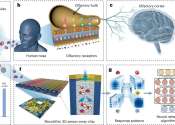New technique stretches out MRI scans of placentas so they can be more accurately analyzed
The placenta is one of the most vital organs when a woman is pregnant. If it's not working correctly, the consequences can be dire: Children may experience stunted growth and neurological disorders, and their mothers are ...
Oct 3, 2019
0
54









